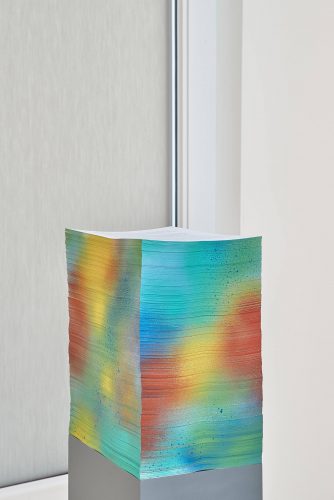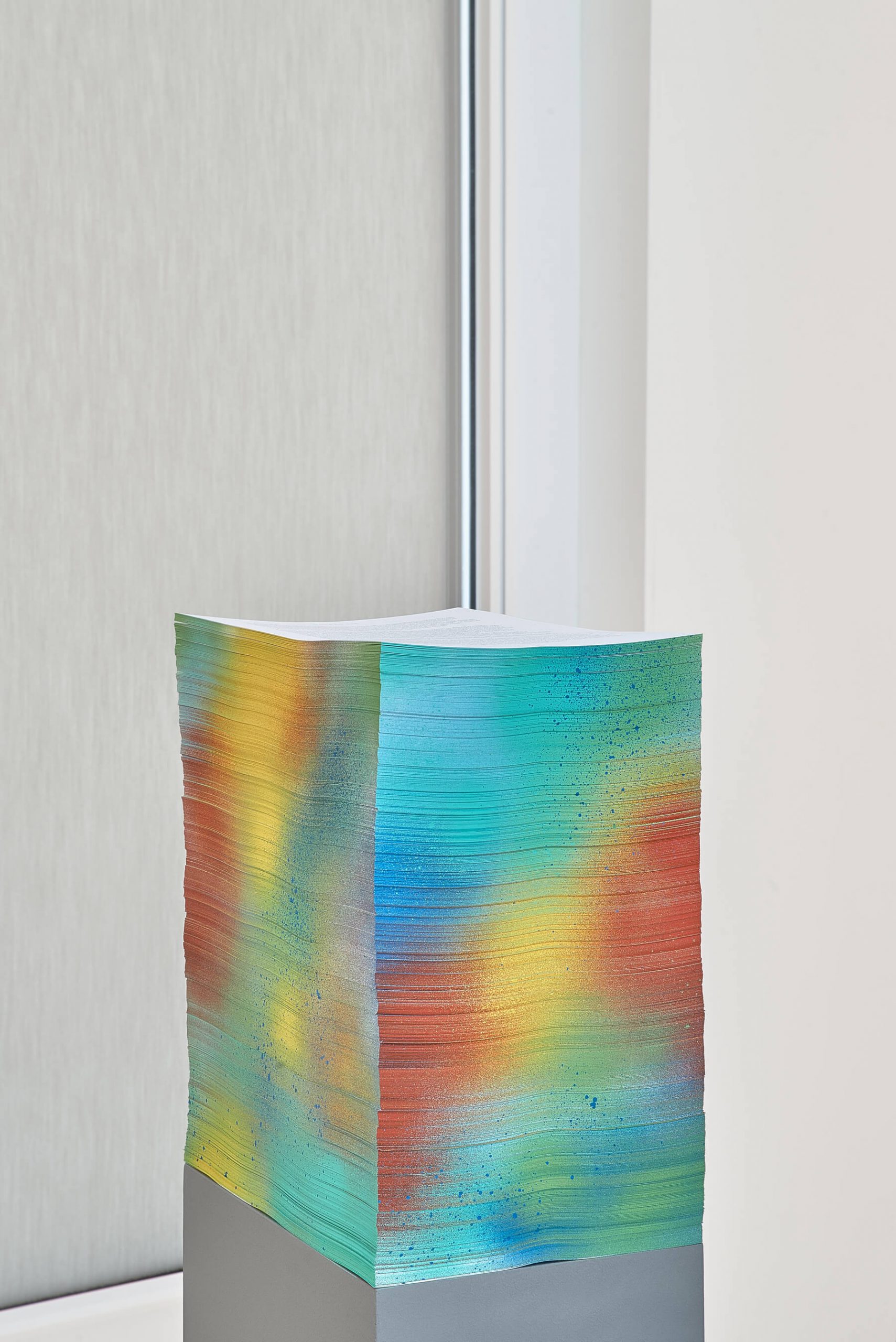“One day he told me and Gallese: “I know a group of researchers in Marseille, they work on the way smells provoke emotions, this could make it possibile to verify if there are mirror neurons for empathy” “How?” we asked. “By using smells that provoke certain emotions and showing at the same time faces that express similar emotions. At this point we can check if in both cases the same areas are activated.” (…) We found then that the same voxels, meaning the same dots in the maps of the functional magnetic resonance, were activated whilst the emotion was evoked by natural stimulations (for example the smell of rotten eggs) and when the subjects were seeing – in fact reading – the same emotion, disgust, in the other. We saw immediately that (…) other people’s emotions weren’t “cognitively” understood but they were felt “directly” as one’s own.”
G. Rizzolatti, A. Gnoli, In te mi specchio, 2016.
If the physical consequences of starvation are known, and we are all familiar with the permanent or ephemeral damage that lack of food causes to the body, we are less informed about the ways in which other deprivations mutilate and irreparably transform us. Living in debt, for example, cripples the soul. Anxiety kills empathy. Fear destroys dignity. Poverty means, above all, that people cannot be certain things, cannot know what life could be if they weren’t economically deprived of their ability to exist. Ultimately people in need, by withdrawing their freedom and their emotional intelligence from the world, dilapidate the patrimony of humanity, erode our capacity to understand each other. And in the desert of their absence, racism, cruelty and indifference grow.
Fifty years ago in many western countries a revolt of young workers and students exploded to reclaim a different life, where love and the exploration of the body could be an important part of everyone’s existence. This meant untying subjectivities from the debt to society, detaching them from the limiting position of being pure workforce or a workforce to be, from having to fight a war or obey their oppressors.
Feminism began to say then – and it’s still saying today – that all we know about love is a patriarchal fairy tale, told over and over again with the sole intention of enchanting an unacceptable state of things. Love is yet to be invented: the simple fact that poverty still exists proves it.
“After several episodes, the knight, who has been received in the castle where his lady is, declares his love to her and is rebuffed. During a long colloquy (…) the knight (…) succeeds in placing a ring on her finger. When later she becomes aware of the ruse, she angrily sends for the knight and demands that he takes back the ring (…) Taking it back, he said “Many thanks;/ Surely the gold has not tarnished,/ if it returns from that lovely hand.”/ She smiled, for the thought that/ he would replace the ring on his;/ but instead he did a shrewd thing/ that later brought him great joy./ He leaned over the pool,/ which was but a span and a half/ in depth, so he did not fail/ to see in the clear water/ the reflection of that lady/ whom he loved more than anything/ in the world. “Know then,” he said,/ “in a world, I will not take it back,/ but my sweet friend will have it, whom/ I love best after yourself.”/ “God!” she answered, “we are alone here,/ where will you find her so quickly?”/ “I swear it, soon you will be shown/ the valorous and noble who will have it.”/ “Where is she?” “By God see her there, look/ at your beautiful reflection that awaits./ For you,” he said, “my sweet friend!”/ As my lady does not wish it,/ You will take it – do not refuse.”/ The water was a bit troubled,/ as the ring fell into it;/ and, when the reflection was dissolved:/ “Behold,” he said, “lady, now she has it.”
G. Agamben, Stanzas, 1993
In Le Lai de l’Ombre, the most admired poem by the Norman trouvère Jean Renart, a knight, who is courting a lady, seeks her spiritual love and nevertheless idolizes her physical image. The lady’s reflection on a pool’s surface finally accepts the ring and the engagement that the woman in the flesh had refused: they live happily ever after. When Renart was writing these lines, the streets of French cities were littered with bodies of homeless people, the muddy roads of the countryside were infested with vagrants fleeing their empty houses and sterile fields to seek survival. The crackdown on contraception and infanticide at that point was so hard that the number of poor, vagabonds and beggars had swollen to unprecedented proportions. In 1179 pope Alexander III condemned in his speech, at the second Lateran council, the parasitical system of loans in place, the mort-gage – which caused people to lose not only their property but the usage and the gains of their business, leaving them with no hope of ever regaining self- sufficiency – but the loan sharks kept strangling the population causing epidemics and endemic misery. Illness and food shortage hit Anjou in 1124, famine decimated Aquitaine between 1161 and 1162 and starvation created an army of deracinated peasants between the Seine and the Escaut in 1197. Mollat writes in Les pauvres au Moyen-Age: “many were forced by such cruel necessity that they took a path contrary to their habits, became criminals and died hung”. Each one of the people who then perished of sickness and hunger, were taken to the scaffold or burnt as witches, often without anyone remembering their name or shedding a tear, if put in the knight’s shoes could have displayed the same delicate sensibility and offered, after a passionate discussion, their love to the trembling image of their beloved one reflected by the surface of a clear pond.
“I have experienced a real regret for the original integrity from which I’ve felt I had taken my distances: in the disorientation of desiring the resonance of another lost woman, I became aware of myself.”
C. Lonzi, È già politica, 1977
Mirror neurons, latest researches have proven it, are responsible not only for our empathy but for our capacity of feeling things as if they were happening to us or we were the ones doing them, although we are just watching them. We don’t need to be told that people are in pain to feel the urge to help them when we see them suffering. The reasons that prevent us from doing it are the same that prevent us from thinking, experimenting, being courageous: we can’t afford it. The luxury of making sense belongs to radical feminists, prison abolitionists, incorruptible philanthropists, war doctors and fearless reporters. Otherwise economy always wins, small calculations are integrated to our selective capacity of recognizing ourselves in others, we live in denial of the evidence of communism. Lonzi writes in her diary a disturbing tale about the social fabric that connects us: “the way she was she couldn’t have helped me, but in the group that I had formed she had found a way of becoming herself and of pushing me to
do the same. So I’ve understood why I had made feminism: in order to make Sara exist, so that she could make me exist”. We can keep ignoring what ties our destiny to the one of others, not see them as our mirrors, neglect what we could have in common, but by doing so we might lose the only possibility that was offered to us of giving a meaning to life. And making sense will remain the ultimate luxury which less and less people will be able to afford.
– Claire Fontaine, Los Angeles, 9/6/18



